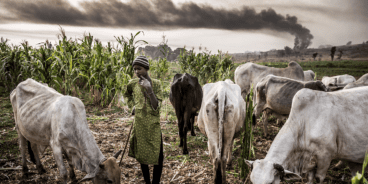
Atrocity Alert No. 94: Syria, South Sudan and Nigeria
Atrocity Alert is a weekly publication by the Global Centre for the Responsibility to Protect highlighting situations where populations are at risk of, or are enduring, mass atrocity crimes.
No ceasefire for 393,000 people in besieged eastern Ghouta
Despite the unanimous adoption of UN Security Council Resolution 2401 on Saturday, 24 February, demanding a 30-day cessation of hostilities, fighting in Syria has not abated. In particular, intense clashes have continued across the opposition-held enclave of eastern Ghouta, where the government’s ongoing airstrikes have killed over 550 civilians in the last ten days. On Monday, 26 February, UN Secretary-General António Guterres demanded the resolution be implemented immediately, warning that “eastern Ghouta cannot wait. It’s high time to stop this hell on earth.”
According to the Syrian Observatory for Human Rights, at least 56 civilians were killed in eastern Ghouta in the two days following the adoption of Resolution 2401. The Violations Documentation Center in Syria also reported that Russia had conducted at least six aerial attacks since Saturday despite the fact that Russian diplomats voted for the ceasefire.
In the days since the adoption of Resolution 2401, Syrian government forces have also launched a new ground offensive against the enclave, resulting in intense fighting. Meanwhile, some armed opposition groups within eastern Ghouta have continued to indiscriminately shell nearby Damascus, killing civilians. Syrian government forces have also continued the illegal use of chemical weapons. On Sunday, 25 February, at least 18 people were treated for symptoms consistent with exposure to chlorine gas in the al-Shayfouniya area of eastern Ghouta. One child died.
The 393,000 people living in eastern Ghouta have been besieged by Syrian government forces since 2013, and only one humanitarian aid convoy has been permitted to reach a mere 7,200 people since December. Despite Russia’s 27 February announcement of daily five-hour humanitarian pauses and the creation of a “humanitarian corridor,” no new aid has been delivered and no civilians have been evacuated. Those civilians who have attempted to flee reportedly face sniper fire, shelling, detention and sexual violence.
Due to the actions of one of its permanent members, Russia, the Security Council has proven utterly incapable of implementing its own resolutions and upholding its responsibility to protect civilians in Syria. The broader international community should intensify efforts to hold all those responsible for alleged war crimes and crimes against humanity accountable, including through the UN’s International, Impartial and Independent Mechanism to assist in the investigation and prosecution of perpetrators of atrocities in Syria.
UN provides list of those responsible for atrocities in South Sudan
Last Friday, 23 February, the UN Commission on Human Rights in South Sudan identified more than 40 senior figures as possibly bearing individual responsibility for war crimes and crimes against humanity committed during 2016 and 2017. These include 3 state governors, 8 Lieutenant Generals, 17 Major Generals, 8 Brigadier Generals and 5 Colonels.
The Commission’s report concludes that the Sudan People’s Liberation Army (SPLA), SPLA in Opposition, and other armed groups continue to perpetrate targeted killings, abductions, rape and sexual violence against civilians on the basis of their ethnic identity and/or presumed political allegiances, as well as deliberately destroying and looting villages.
In accordance with the Commission’s expanded mandate, evidence against senior government and military officials should now be made available to all transitional justice mechanisms, including South Sudan’s proposed Hybrid Court, which was supposed to be established as part of the 2015 Peace Agreement. The government has repeatedly delayed the formation of the Hybrid Court and has failed to domesticate the draft statute. During the second round of the High Level Revitalization Forum from 5-16 February – a regional diplomatic initiative to reinvigorate the Peace Agreement – the government also refused to sign a “Declaration of Principles” document due to a clause calling for punitive measures against those obstructing the peace process.
After almost five years and countless failed peace agreements, the pervasive culture of impunity in South Sudan requires an urgent and concerted response from the international community. The UN Security Council and African Union should immediately impose an arms embargo on South Sudan and targeted sanctions against all political leaders and senior military figures responsible for committing atrocities, regardless of their rank or affiliation.
Boko Haram attacks and kidnaps schoolgirls in Nigeria
Following a 19 February attack by Boko Haram on a school in the Nigerian town of Dapchi, Yobe State, 110 girls remain missing. Boko Haram, an armed extremist group, has targeted and destroyed almost 1400 schools since 2009. It was also responsible for the notorious abduction of 276 girls from Chibok in 2014 and the abduction of 300 elementary students in Damasak, Borno State, during 2015.
The situation in Nigeria’s northeast, where Boko Haram once held significant territory, remains perilous despite years of military operations by the Nigerian army and a regional Multinational Joint Task Force. Boko Haram continues to stage sporadic raids and deadly terrorist attacks in Nigeria as well as in neighboring Niger, Chad and Cameroon. Insecurity caused by Boko Haram continues to undermine efforts to restore economic and social life in much of Nigeria’s northeast.
Despite losing all of its territory and suffering significant military defeats, Boko Haram still poses a serious threat to civilians in Nigeria and across the wider Lake Chad Basin region. The international community should assist all efforts to free the Dapchi schoolgirls and other civilians kidnapped by Boko Haram. In addition to improving security across Nigeria’s northeast, it is also important for the government to advance reconstruction efforts and address the root causes of violent extremism.


Atrocity Alert No. 444: Nigeria, Haiti and South Sudan
